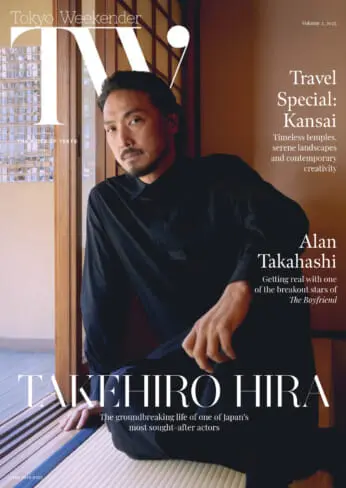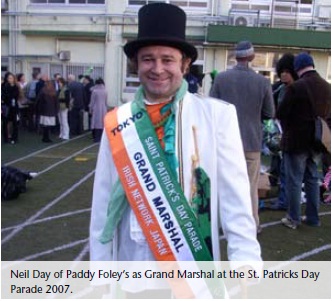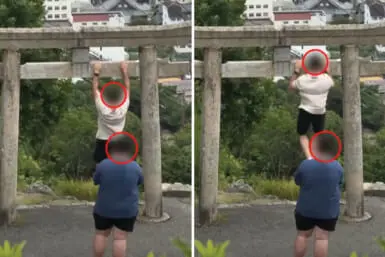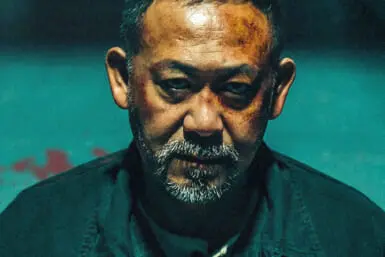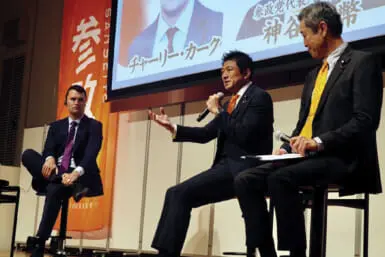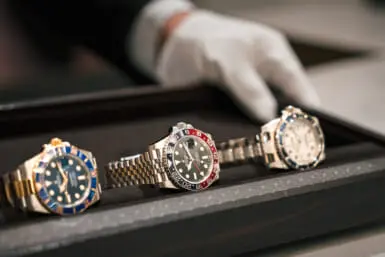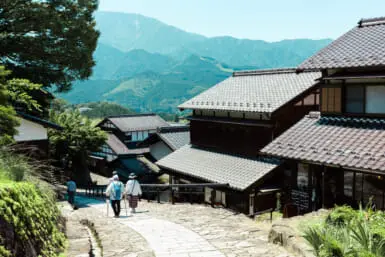Profile of Neil Day of Paddy Foley’s
by Michael Mahoney
Neil Day never imagined that he’d settle in Japan. He also never imagined that he’d sing in a rock band, act on stage, play on a cricket team, meet Dennis Lillee, be a popular DJ, manage a pub or be sent to an immigration detainment center for nearly a month. Yet all of these experiences did happen to him in Japan, a place that, twenty years after his arrival, he still loves.
“In Japan, these things come out of the blue,” he said with a smile. “There’s always a chance to experience something, to learn something new here,” he says with a laid-back, good-natured enthusiasm, which makes him so popular among guests at Foley’s. (Just before his arrival, a number of guests could be heard asking other staff when he would be in.)
Day came to Japan in October 1987. It was at a time when Ireland was suffering from 20 percent unemployment and around 90 percent of his graduating college class left the country, simply because there were no jobs available. The government-sponsored FAS Program—which sent youth to work abroad for a few years to learn new skills and then return to help develop Ireland—arranged for Day to interview with Ricoh, the Japanese office automation company. The company offered him a job and Day arrived with dozens of other Irish graduates to work in what was then ‘the Dragon of the East.’ Day knew that life would not be easy at first, and indeed it presented a number of challenges. He had no Japanese language skills, other than a one-month crash course offered to him upon arrival by his company.
“I wanted to get the first three months over with. I knew that I’d be a fish out of water, making stupid mistakes—and it did happen”, he recalled. “[But] the hardest part of being here was saying goodbye to [my] culture,” Day continued, citing the lack of English-language print media, home-from-home TV, and internet, as well as the lack of sports clubs and pub-life in 1980s Japan.
But he did not let this get him down. Instead, Day became actively involved with the Irish Network in Japan and, by 1990, was elected Chairman. While involved with the group, their activities diversified and expanded to include Tokyo’s first-ever St. Patrick’s Day Parade, Christmas and Halloween events, an annual Irish sports day and live music events such as the Celtic Festival Japan. In that time, foreigners in Japan had a real interest in sharing their countries and cultures with the Japanese, and those who were here ‘had a knack’ at banding together, according to Day.
Day continued his work at Ricoh for twelve years and, upon leaving the company, spent various amounts of time working as R&D manager for an internet applications company (Digital Garage), traveling to promote the MPEG-7 standard at conferences and, when these plans didn’t work out, took up teaching and other odd jobs. During his time here, he sang with a rock band (“you know, White Snake, Pink Floyd…” he said with a chuckle); gained popularity as a DJ and even acted on stage (as the main character in an Irish comedy play).
After being here for 16 years, Day ran into immigration problems and was forced into an immigration detainment center for three and a half weeks, while he appealed the court’s order for his deportation. He had been charged with “overstaying his visa”. (Although Day had indeed applied in time, he was never advised about the proper procedures and thus did not take his documents abroad for processing, resulting in his inadvertent overstay.) The issue was finally resolved when he was able to consult a lawyer. Her efforts—as well as the support of two former ambassadors to Japan (who were familiar with his Celtic cultural events), several Japanese people and a letter from the Prime Minister of Ireland asking for the government’s understanding—got him released on bail and eventually the overturning of the deportation order.
When he came to Foley’s in 2003, the place was a shambles: the walls were black and decorated in graffiti; the lone washroom had a broken hand-dryer; the area near the cash register always stank. Food was not served, and the bar was suffering from mismanagement.
Day made Foley’s into the great place that it is today. He surveyed the customers to see what they wanted, and he ran with it: a company was hired to source and repair the ‘stink’; he repaired the ‘broken things’ (i.e., hand-dryer), and made the separate women’s washroom; he knocked down a wall, thus opening up the bar area, and made a music room out of the former storage area, and used his technical prowess to establish an advanced high-tech AV broadcast system. With the latter achievement, Foley’s became the first bar in Tokyo to offer extensive rugby and cricket coverage, as well as live coverage of sporting events back home. As the only place to show (‘without hitch’) all of the matches in England’s Ashes Trophy—a monthlong cricket championship series—“Foley’s really hit it big with the expats”, Day said.
Over his years here, Day has noticed many changes in the foreigner community, as well as changes in the Japanese perceptions of the foreigners in their midst. On the one hand, he states that Tokyo has become much more cosmopolitan and, with the better social and business infrastructure, has become easier for foreigners to get on their feet in Japan. With increased cultural contacts, business exchanges and programs such as the JET Program, it is much easier for foreigners to come here.
Despite this increase in visibility, however, acceptance of them has changed for the worst. He credits xenophobic comments from certain political leaders in Japan (to the effect of ‘beware of groups of foreigners at night; they will cause trouble’), the media’s tendency to stereotype foreigners as potential criminals and the frequency by which police check foreigner registration cards in the street (without due reason) as having made Japan generally less welcoming to foreigners than before.
Yet he repeats that he loves the place and, in the future, is open-minded to things, which would allow him to stay here longer or even move abroad again. However, his fascination for computers and technology remains avid and he recalls his long-held dream of wishing to work for NASA with wide-eyed enthusiasm.
With all of these amazing experiences and acquired knowledge, does Day have any advice for those just arriving to Japan?
“Don’t forget to be yourself,” he says in earnest. “You hear about Japan [back home], and adapting is good, but you have to maintain your own character. You can never be Japanese. You have to be openminded, and accept things.”
